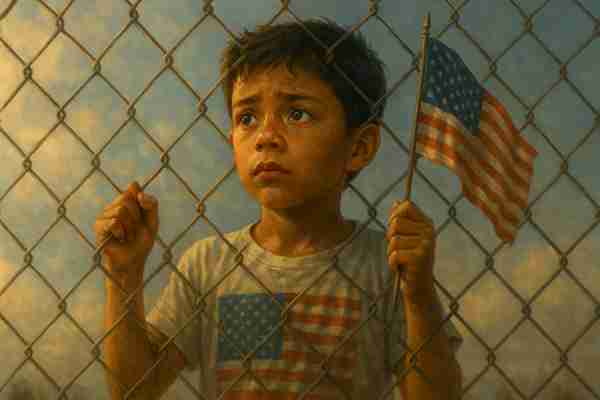In the small town of Springville, in southern Arizona, lived a boy named Julio. He was born to Mexican migrant parents who had crossed the border just weeks before his birth. His mother, Maria, worked on farms, while his father, Javier, repaired cars. America was the only home Julio knew—with its yellow school buses, baseball evenings, and the smell of hot dogs at the supermarket. From a young age, Julio sensed he was different. At school, he was diligent, but classmates sometimes said, "You don’t belong here" or "You’re not a real American." He didn’t understand why. He spoke English better than his parents, knew Pittsburgh from Portland, and dreamed of becoming a doctor. Everything changed in July 2025 when President Trump signed an order ending birthright citizenship for migrant children. The news reported, “Being born in the U.S. no longer guarantees citizenship.” Maria held Julio close as they watched the TV. Her eyes were filled with fear. “Mom, am I not a citizen?” he asked softly. “Of course you are, mi hijo,” she replied, her voice trembling. Soon, unrest began in Springville. Hundreds gathered in the park—some waving flags, others holding signs like “Birthright is the law!” and “America is my home.” Julio attended with his parents. A local journalist photographed him in a worn-out shirt with an American flag and a sign reading, “I was born here.” A young lawyer named Sarah Kim approached them. She promised to help. “You are a citizen. No one can take that away.” Sarah filed a lawsuit on behalf of several families. The case reached a federal court in New Hampshire. Julio didn’t grasp all the legal details, but he knew people were fighting for him. While lawyers battled in court, he entered a school essay contest about civic rights. His piece, “My America,” won first prize. Weeks later, the court ruled Trump’s order unconstitutional. That day, the park filled again—this time with music, hugs, and joy. Julio stood on stage beside Sarah and took the microphone. “I was born here. I love this country. I want to learn, help people, and contribute to my homeland. I am an American—not because someone allowed me, but because this is my land.” The crowd erupted in applause. And in that moment, Julio understood—citizenship is not just a document. It’s recognition, belonging, and the right to raise your voice and be heard.
Julio and the Right to a Homeland

Published : 11.07.2025
